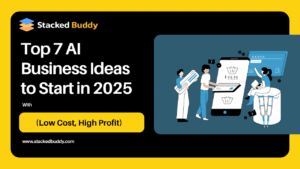In the ever-evolving landscape of entrepreneurship, 2025 promises a wealth of opportunities for aspiring business owners seeking ventures that require minimal upfront investment yet offer substantial returns. With economic shifts driven by technology, remote work, and sustainability, low-cost best business ideas are more accessible than ever. Whether you’re a side-hustler looking to supplement income or a full-time entrepreneur aiming for financial independence, the key lies in leveraging digital tools, personal skills, and emerging trends.
This article explores some of the best low-cost, high-profit business ideas tailored for 2025. These ideas typically require startup costs under $1,000, focusing on scalability, low overhead, and high margins. From digital products to service-based gigs, we’ll delve into how to get started, potential earnings, and tips for success. For more on bootstrapping your startup, check out our comprehensive guide at https://likiy.net/startup-bootstrapping-tips.
Drawing from industry insights, these ideas align with growing markets like e-commerce, AI integration, and wellness. According to recent analyses, sectors such as digital marketing and content creation are projected to see exponential growth, with profit margins often exceeding 50% for savvy operators. Let’s dive into the top picks.
1. Dropshipping E-Commerce Store
Dropshipping remains a powerhouse for low-cost entrepreneurship in 2025. This model allows you to sell products online without holding inventory—suppliers handle storage and shipping. Startup involves setting up a store on platforms like Shopify or WooCommerce, selecting niches like eco-friendly gadgets or fitness gear, and marketing via social media.
Costs are minimal: around $200 for a domain, website, and initial ads. Profit potential is high, with margins of 20-50% per sale. Successful dropshippers earn $5,000-$50,000 monthly by scaling with targeted Facebook or TikTok ads. Focus on trending products using tools like Google Trends. For niche selection tips, visit https://likiy.net/ecommerce-niche-guide. As noted in business resources, this model’s low overhead makes it ideal for beginners.

2. Affiliate Marketing
Affiliate marketing lets you earn commissions by promoting others’ products through links on your blog, social media, or YouTube channel. In 2025, with affiliate spending soaring, this passive income stream is perfect for content creators.
Start with zero to $100 by joining programs like Amazon Associates or ClickBank. Build an audience around niches like tech reviews or beauty tips. Top affiliates make $10,000+ monthly via email lists and SEO-optimized content. Profit margins are nearly 100% since there’s no product creation involved. Enhance your strategy with free tools like Canva for visuals. Learn more about digital marketing on our site at https://likiy.net/digital-marketing-basics.
3. Freelance Services (Writing, Design, or Consulting)
Freelancing capitalizes on your skills for high-profit gigs. In 2025, demand for remote freelancers in writing, graphic design, or business consulting surges with AI tools aiding efficiency.
Platforms like Upwork or Fiverr require no upfront cost beyond a profile setup. Charge $50-$200/hour based on expertise. Profitable niches include AI content optimization or social media consulting, yielding 70-90% margins. Many freelancers hit $100,000 annually by building client portfolios. Network on LinkedIn for gigs. For freelancing success stories, see https://likiy.net/freelancer-stories.
4. Online Tutoring or Coaching
With education going digital, online tutoring or life coaching offers low-barrier entry and high returns. Specialize in subjects like languages, coding, or wellness coaching using Zoom or Teachable.
Startup costs: under $100 for a webcam and platform subscription. Sessions at $30-$100/hour can net $4,000 monthly part-time. High-profit due to scalable group classes. In 2025, AI-personalized coaching boosts demand. Certify via online courses for credibility. Explore coaching tools in our article at https://likiy.net/coaching-tools-2025.
5. Content Creation (YouTube or TikTok)
Content creation explodes in 2025 with short-form videos and podcasts. Monetize via ads, sponsorships, or merchandise on platforms like YouTube or TikTok.
Begin with a smartphone—costs near zero. Creators in niches like finance tips or DIY hacks earn $1,000-$20,000 monthly once monetized. Margins are high (80%+) from passive ad revenue. Consistency and SEO are key; use analytics for growth. For content strategy, check https://likiy.net/content-creation-guide.
6. Selling Digital Products (E-books, Courses)
Create once, sell infinitely—digital products like e-books, printables, or courses are ultimate high-profit ventures.
Use free tools like Canva; upload to Etsy or Gumroad for $0-$50 startup. Prices from $10-$100 yield 90% margins. In 2025, AI-assisted creation speeds production. Successful sellers make $5,000+ passively. Market via Pinterest or email lists. Dive deeper into digital sales at https://likiy.net/digital-products-tips.
7. Pet Sitting or Dog Walking
For animal lovers, pet services offer flexible, low-cost income. With pet ownership rising, demand peaks in 2025.
Start with apps like Rover—costs under $50 for background checks. Charge $20-$50 per walk/session, potentially $3,000 monthly. High margins (70%) from minimal supplies. Expand to boarding for more profit. Local marketing via flyers works wonders. Read about pet business trends on https://likiy.net/pet-industry-insights.
8. Social Media Management
Businesses need online presence; manage their accounts for steady income.
Learn via free YouTube tutorials; tools like Hootsuite cost $50/month. Charge $500-$2,000 monthly per client. In 2025, AI analytics enhance services, boosting margins to 60-80%. Secure 5-10 clients for $10,000+ revenue. Network on X (formerly Twitter) for leads. For social media tools, visit https://likiy.net/social-media-tools.
9. AI-Powered Consulting
Leverage AI trends by offering consulting on tools like ChatGPT for businesses.
Self-educate for free; startup $100 for a website. Fees $100-$500/hour, with high demand yielding $8,000 monthly. Profits soar (85%) due to expertise-based model. In 2025, focus on small business automation. Build credibility with case studies. Learn AI basics at https://likiy.net/ai-for-business.
10. Print-on-Demand Merchandise
Design custom apparel or accessories; print only when sold.
Use platforms like Printful—costs $0 to start. Sell via Etsy; margins 30-50%. Artists earn $2,000-$10,000 monthly in niches like motivational quotes. 2025 sees eco-friendly prints trending. Promote on Instagram. For design inspiration, see https://likiy.net/print-on-demand-guide.
11. Virtual Event Planning
With hybrid events rising, plan webinars or online workshops.
Tools like Eventbrite are free; startup under $200. Charge $1,000-$5,000 per event, with 70% margins. In 2025, tech integration boosts appeal. Network via LinkedIn. Explore event trends at https://likiy.net/virtual-events-2025.
12. Newsletter Publishing
Curate niche newsletters on Substack or Beehiiv.
Free to start; monetize via subscriptions ($5-$20/month). Top publishers earn $50,000+ annually with engaged lists. High margins (90%) from digital delivery. Focus on topics like tech or finance. Grow with social shares. For newsletter tips, visit https://likiy.net/newsletter-strategies.
Conclusion
2025 is ripe for low-cost, high-profit businesses that harness digital innovation and personal passions. From dropshipping to AI consulting, these ideas offer flexibility and scalability with minimal risk. Success hinges on consistent marketing, customer focus, and adaptation to trends like sustainability and AI.
Remember, starting small and iterating is key. Track finances with tools like QuickBooks, and consider legal setups via sites like LegalZoom. For ongoing inspiration, subscribe to our newsletter at https://likiy.net/subscribe. With dedication, these ventures can lead to financial freedom—start today!

Business FAQs
1. What are the best business ideas for 2025?
Some of the top business ideas include e-commerce stores, AI-driven services, digital marketing agencies, health and wellness products, and sustainable businesses focusing on eco-friendly solutions.
2. How do I start a small business with little money?
You can start by choosing a low-cost idea such as freelancing, dropshipping, print-on-demand, or offering online services. Creating a lean business plan and leveraging free digital tools helps minimize expenses.
3. What makes a best business ideas successful?
Success depends on factors like a strong value proposition, good financial management, effective marketing, excellent customer service, and adaptability to market changes.
4. How do I write a best business plan?
A good business plan includes an executive summary, business goals, target market research, marketing strategy, financial projections, and operational details. Tools like templates and software can make the process easier.
5. What are the most common challenges small businesses face?
The most common challenges include cash flow issues, customer acquisition, competition, managing expenses, and keeping up with digital marketing trends.
6. How can I finance my best business ideas?
Funding options include personal savings, small business loans, angel investors, venture capital, crowdfunding, or government grants.
7. What is the role of digital marketing in best business growth?
Digital marketing helps businesses increase visibility, reach target customers, build trust, and drive sales through SEO, social media, content marketing, and paid ads.
8. How do I register my business?
The process depends on your location, but generally, you’ll need to choose a business name, register it with local or federal authorities, obtain licenses or permits, and open a business bank account.
9. What are the benefits of running an online business?
Online businesses have lower overhead costs, flexible work schedules, access to a global audience, and faster scalability compared to traditional brick-and-mortar businesses.
10. How can technology help my business grow?
Technology improves efficiency, automates tasks, enhances customer experiences, and provides valuable data insights. Tools like CRM software, e-commerce platforms, and AI can significantly boost growth.
Related Business FAQs
1. What industries will grow the most in 2025?
Sectors like e-commerce, renewable energy, artificial intelligence, health & wellness, and fintech are projected to see rapid growth in 2025 and beyond.
2. What is the best software for managing a small business?
Popular choices include QuickBooks for accounting, HubSpot for CRM and marketing, and Slack or Microsoft Teams for team collaboration.
3. How important is branding for a business?
Branding is crucial because it builds trust, creates recognition, and differentiates your business in competitive markets.
4. What are the best ways to market a new business?
Effective strategies include SEO optimization, social media marketing, influencer partnerships, and running paid ad campaigns.
5. Can I run a business from home?
Yes, many successful businesses start from home, especially online ventures like e-commerce, freelancing, and consulting services.
6. What are some low-risk businesses to start?
Freelance services, online tutoring, affiliate marketing, print-on-demand, and digital products are generally considered low-risk.
7. How do I choose the right business structure?
The choice depends on liability, taxes, and funding needs. Options include sole proprietorship, LLC, corporation, or partnership.
8. How do I balance business growth with financial stability?
By creating realistic budgets, reinvesting profits, monitoring cash flow, and avoiding unnecessary expenses.
9. What skills are essential for business owners?
Key skills include leadership, financial management, communication, adaptability, and digital marketing know-how.
10. How can I make my business stand out?
Focus on offering unique value, exceptional customer service, competitive pricing, and a strong online presence.

🛠️ Top Business Products & Tools for 2025
📊 Finance & Accounting Business ideas
- QuickBooks Online – Simplifies accounting and bookkeeping.QuickBooks Online is one of the most popular accounting solutions for small to medium-sized businesses, offering an easy-to-use platform that simplifies bookkeeping, invoicing, expense tracking, and financial reporting. Designed with business owners in mind, it allows you to manage your finances from anywhere with cloud access, making it ideal for remote teams or entrepreneurs on the go. QuickBooks Online also integrates with hundreds of apps, streamlining tasks like payroll, tax preparation, and inventory management. With features such as real-time dashboards, automated bank feeds, and customizable reports, it helps business owners save time, reduce errors, and stay on top of their financial health.
- FreshBooks – Great for freelancers and small businesses.FreshBooks is a user-friendly accounting and invoicing software tailored for freelancers, entrepreneurs, and small business owners who want to simplify financial management without needing advanced accounting knowledge. It makes it easy to create professional invoices, track expenses, log billable hours, and accept online payments, all from one intuitive dashboard. FreshBooks also offers time-tracking and project management tools, making it especially valuable for service-based businesses. With cloud accessibility, mobile apps, and integration with popular platforms like PayPal, G Suite, and Shopify, FreshBooks helps streamline daily operations while ensuring financial accuracy. It’s a powerful solution for business owners who want to save time and focus more on growth than paperwork.
- Wave Accounting – Free accounting software for startups.Wave Accounting is a free, cloud-based financial management tool designed for freelancers, startups, and small business owners who want professional-grade accounting without the high costs. It offers essential features like income and expense tracking, invoicing, receipt scanning, and bank connections, making it easy to keep finances organized. With its clean interface and simple setup, Wave Accounting is accessible even for those with little accounting experience. The platform also provides optional paid services such as payroll and payment processing, giving businesses flexibility to scale as they grow. By combining affordability with efficiency, Wave Accounting has become a go-to solution for entrepreneurs looking to manage their books with ease.
📈 Marketing & Growth Business ideas
- HubSpot CRM – All-in-one marketing, sales, and customer management.
- SEMrush – SEO and keyword research tool.
- Canva Pro – Easy design tool for social media and branding.
🤝 Collaboration & Productivity Business ideas
- Slack – Team messaging and workflow integration.
- Microsoft Teams – Chat, video conferencing, and collaboration tools.
- Trello / Asana – Project management and task organization.
🌍 E-commerce & Online Business ideas
- Shopify – Best platform for building online stores.
- Wix / WordPress – Affordable website builders with business tools.
- Printful – On-demand printing and fulfillment for online stores.
🔒 Security & Management business ideas
- LastPass – Password management for business security.
- Google Workspace – Professional email, cloud storage, and collaboration tools.
- Zoom – Essential for meetings and client communication.